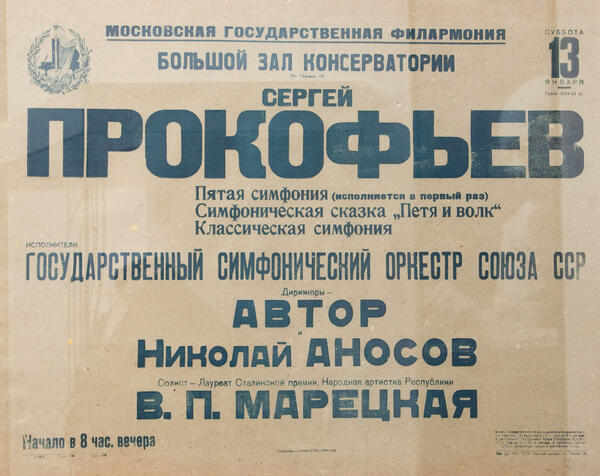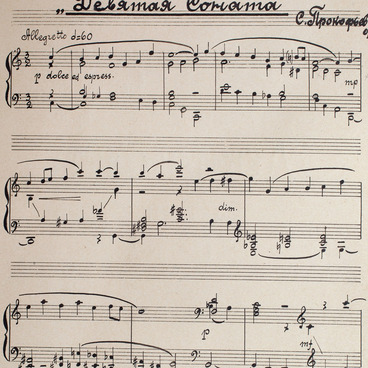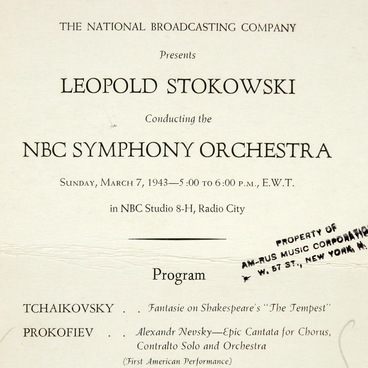On January 13, 1945, Sergei Prokofiev gave a concert at the Great Hall of the Conservatory that turned out to be his last. The program included the premiere of the Fifth Symphony conducted by the composer himself, the symphonic fairy tale “Peter and the Wolf”, and the Classical Symphony conducted by Nikolai Anosov. The war was not over yet. Before the beginning of the concert, the announcer informed the audience of another victory of the Soviet army.
The pianist Sviatoslav Richter described what happened next, “When Prokofiev had taken his place on the podium and silence reigned in the hall, artillery salvos suddenly thundered forth. His baton was raised. He waited and began only after the cannons had stopped. There was something very significant in this, something symbolic. It was as if all of us — including Prokofiev — had reached some kind of shared turning point… In the Fifth Symphony, he rises to the full height of his genius. Moreover, we see time and history, war, patriotism, and victory… Victory in general and Prokofiev’s victory. This was when he won finally. He had always won before, that’s true, but this time he as an artist won forever.”
The opinions on this concert were divided. The composer Nikolai Miaskovsky attended the rehearsals of the symphony and highly praised it. After listening to the last two movements, he wrote in his diaries, “The third movement is fierce and engaging. The final movement is light and playful with a resonant coda.” However, he was not as satisfied with the premiere, writing, “The symphony turned out to be somewhat heavy.” The Soviet music scholar and orchestra expert Dmitry Rogal-Levitsky criticized Prokofiev’s conducting and claimed that the composer “failed the premiere, without leaving any genuine impression.”
A few days after the concert, Prokofiev suffered a bad fall, hit his head, and was hospitalized with a brain concussion. He was in serious condition. Dmitri Kabalevsky who visited Prokofiev at the hospital recalled their meeting, “I could never forget that sad visit. Prokofiev lay completely motionless. From time to time he could not recognize the people he was talking with and would lose consciousness. In a weak voice, he asked a few questions about my visit with Jean Sibelius, complaining bitterly about the enforced break in his own working routine. I went away from him with sad thoughts. It seemed this was the end…”
The concert turned out to be Prokofiev’s last performance in front of a large audience.
The pianist Sviatoslav Richter described what happened next, “When Prokofiev had taken his place on the podium and silence reigned in the hall, artillery salvos suddenly thundered forth. His baton was raised. He waited and began only after the cannons had stopped. There was something very significant in this, something symbolic. It was as if all of us — including Prokofiev — had reached some kind of shared turning point… In the Fifth Symphony, he rises to the full height of his genius. Moreover, we see time and history, war, patriotism, and victory… Victory in general and Prokofiev’s victory. This was when he won finally. He had always won before, that’s true, but this time he as an artist won forever.”
The opinions on this concert were divided. The composer Nikolai Miaskovsky attended the rehearsals of the symphony and highly praised it. After listening to the last two movements, he wrote in his diaries, “The third movement is fierce and engaging. The final movement is light and playful with a resonant coda.” However, he was not as satisfied with the premiere, writing, “The symphony turned out to be somewhat heavy.” The Soviet music scholar and orchestra expert Dmitry Rogal-Levitsky criticized Prokofiev’s conducting and claimed that the composer “failed the premiere, without leaving any genuine impression.”
A few days after the concert, Prokofiev suffered a bad fall, hit his head, and was hospitalized with a brain concussion. He was in serious condition. Dmitri Kabalevsky who visited Prokofiev at the hospital recalled their meeting, “I could never forget that sad visit. Prokofiev lay completely motionless. From time to time he could not recognize the people he was talking with and would lose consciousness. In a weak voice, he asked a few questions about my visit with Jean Sibelius, complaining bitterly about the enforced break in his own working routine. I went away from him with sad thoughts. It seemed this was the end…”
The concert turned out to be Prokofiev’s last performance in front of a large audience.



